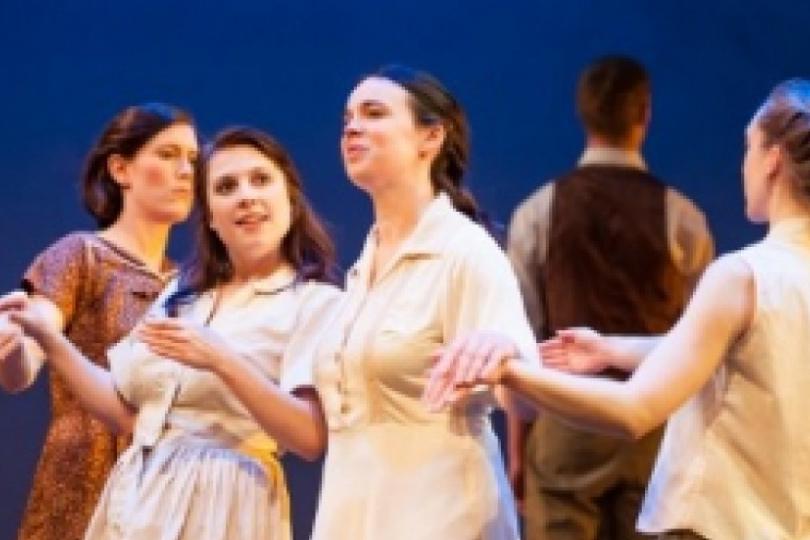REVIEW: Three plays in five days
Review

Editor's note: In our ongoing efforts to examine the state of local theater criticism, we've recruited esteemed playwright Dominic Orlando to contribute his thoughts on shows around the Twin Cities. Look for his reviews every other Wednesday.
Anyone really curious about theatre as an art form should try my little experiment. See a touring production of Evita at the Orpheum; Lola Arias’s The Year I Was Born, the final show in the Walker’s “Out There” series; and Transatlantic Love Affair’s Ash Land at The Illusion—all in less than a week. I’d make some clever joke about theatrical whiplash, but actually the shows had one glaring thing in common (to this viewer of course): the absence of a traditional playwright.
Reviewing Evita is like pissing into the ocean, but let’s give it a try—starting with a minor digression. The friend of mine who was supposed to come to the opening of Cabaret (reviewed two weeks ago) bailed the day before. Could have been something I said, but the excuse given was, having been blown away by Niwa Gekidan Penino over at The Walker, why settle for something as glossy and slickly produced as a downtown production of Cabaret? If there’s one thing I hope to accomplish with this column, it’s to hammer home the parochialism of that view. This far into the second millennium of the art form, there’s little to be gained by a brisk dismissal of either Cabaret or Niwa Gekidan Penino (see my review at a rival website to understand why some Cabaret-lovers might dismiss that piece). Both shows are playing for the same team: Artistic integrity, professional rigor, and theatrical joy. You might counter that it’s all a matter of taste, to which I would respond: if only human beings were that simple.
I thought of all this just a few minutes into Evita. There was something so bombastic and overdone about the production — it seemed my friend’s perfect nightmare of downtown music-theater. Of the three criteria I just threw together, Evita scores only on professional rigor. The show was expertly produced, choreographed and performed, but artistically there wasn’t even much of an attempt, and the only joy I could see involved the lovely sound of cash registers ringing up the gate. The (mostly local) orchestra was incredible, but while all the performers were in excellent voice, only Peron (Sean MacLaughlin) seemed to take any pleasure in what he was doing, which, of course, made him a lot more fun to watch.
It wasn’t until I started putting this article together that I realized Evita, the oldest of these three shows, also doesn’t have a playwright involved. It’s interesting that Webber & Rice originally released Jesus Christ Superstar as an album, because that’s what Evita seems like most of the time—a collection of songs, all them good, some of them great (especially when played this well). In the first act, there’s a remarkable sense of the story moving forward without any of the plot details really landing—it works, especially for a musical. But when the show turns toward Eva Peron’s political career, the breezy attention to detail starts to wobble. Even the show’s signature song — which I don’t even have to name — is less than it might have been, since the actual moment Eva Peron becomes Evita — when a ruthlessly ambitious woman suddenly realizes that the crowd she’s helping exploit loves her to the point of worship—is not really in the play. The production uses newsreel footage that’s more artistically appropriate than they might realize; this story is told from the outside, with only an occasional nod toward the kind of emotional expansion musicals traditionally exist to provide.
****
The last piece in this year’s Out There Series at The Walker, The Year I Was Born has text by the director, Lola Arias, in collaboration with the performers and artistic team. The piece tells the story of the Chilean coup that unseated Salvador Allende, and the Pinochet dictatorship that ensued, through the memories and recollections of the generation born while it was all unfolding. The nine performers give us both recollections from their childhood and stories about their parents they uncovered once they became adults. Through this pastiche of multiple monologues and theatre games, history emerges.
Like many pieces lacking a central narrative voice, the performers end up carrying the day. There’s a curious and effective disconnect between their collectively charming stage presence and the volatile politics of Chile’s last forty years. The specificity of these politics was refreshing to an American ear — a recently celebrated play about U.S. drone pilots (George Brant’s Grounded) is casually described by the Times as having a complete absence of political context, an all-too-familiar refrain in this country. Most
of the dramas about Iraq or 9/11 to reach the stage in the last decade seemed likewise concerned with life on the ground—deeply effecting personal stories—with the actual decision-makers kept politely off stage, as if political situations were more like bad weather rather than the result of anyone’s actual choices.
The Year I Was Born is one of countless recent shows developed by the ensemble with “text” credited to a single individual. While the piece doesn’t make a single gesture toward traditional storytelling, it’s interesting how many of its stylistic choices were familiar to me. This is the second “Out There” piece to adapt the true stories of its cast, and the third such piece I’ve seen at The Walker in the last six months. There was also the playful use of video. The live music, instruments taken up by cast members in a cool, off-hand way. The celebrated “avant-garde dance break” as we used to call it in the ‘90s (I’ve abused that one myself), where the performers break into a silly choreographed number to signal a shift in topic. Tables and desks for that faux academic feel. I’m not trying to take potshots, but as much as I liked the piece, it lagged often, and I’m wondering if that’s because many of these stylistic choices, originally meant to distance us from the material in a productive way, have become so over-used they no longer serve their purpose.
****
Which brings us to Transatlantic Love Affair’s beautiful, elegiac Ash Land conceived and directed by co-founder Diogo Lopes and created by the Transatlantic Love Affair Ensemble. I don’t want to say too much about the performance style. The freshness of it is part of the treat, but it scores high marks on that triumvirate of artistic integrity, professional rigor and theatrical joy. There’s no company bio in the program. I’m unsure whether they consider themselves dance-theater, movement-theatre or just plain ol’ theatre. Whatever the label, the important thing is, the “theatre” part isn’t tossed out the window. The story that’s told is as basic as a myth or a fairy tale, but it’s incredible how little dialogue, set or costumes we need when every movement, no matter how stylized, fires a specific image and/or emotion in our brains. This brand of specificity is in no way proscriptive—a lot of Ash Land takes place in your imagination, which I assume will be very different from mine.
Michael Wangen’s lighting does a lovely job of carrying most of the design (there’s no set credit in the program, and I assume the cumbersome upstage screen was somehow a given in the space). The language of music is frustratingly clichéd— we can just say that Harper Zwicky does a great job, both in composition and performance, and you will miss the music in the more quiet moments. The Ensemble handles everything with effortless precision, particularly co-founder Isabel Nelson, Heather Bunch and Allison Witham. Mr. Lopes doesn’t guide them perfectly through every gestural moment, but the action glides by with such a dream-like fluidity, the glitches become part of the overall mosaic.
Gemma Irish is credited as “script consultant”—what exactly that means is hard for an audience-member to say. There’s definitely a story—about family farms, drought, and the cruelty of banks—which, as I mentioned, is almost mythic in its sparse familiarity. Combined with the performance techniques, it grabs hold of us early, but as time goes by its flatness becomes a real problem. When I get into debates with colleagues about theatre, I sometimes feel like it’s still the 1970s and Neil Simon rules the boards with an iron hand. Yes, plot is often a tiresome trick, and psychological realism can feel heavy-handed and fake, but there’s still the crucial question—and I mean it as a question: if we’re not sticking around out of real attachment to these characters, or to see the twists and turns of the story to its climax, then why are we sticking around? After just about an hour of Ash Land any love we have for this created world starts to falter—but there’s almost half again more to go.
This is not to undermine what comes before it. You should not miss this show. But I want to continue mulling over this question of narrative and its place—traditionally, the realm of the playwright, but more and more taken out of his or her hands, with equally mixed results.




